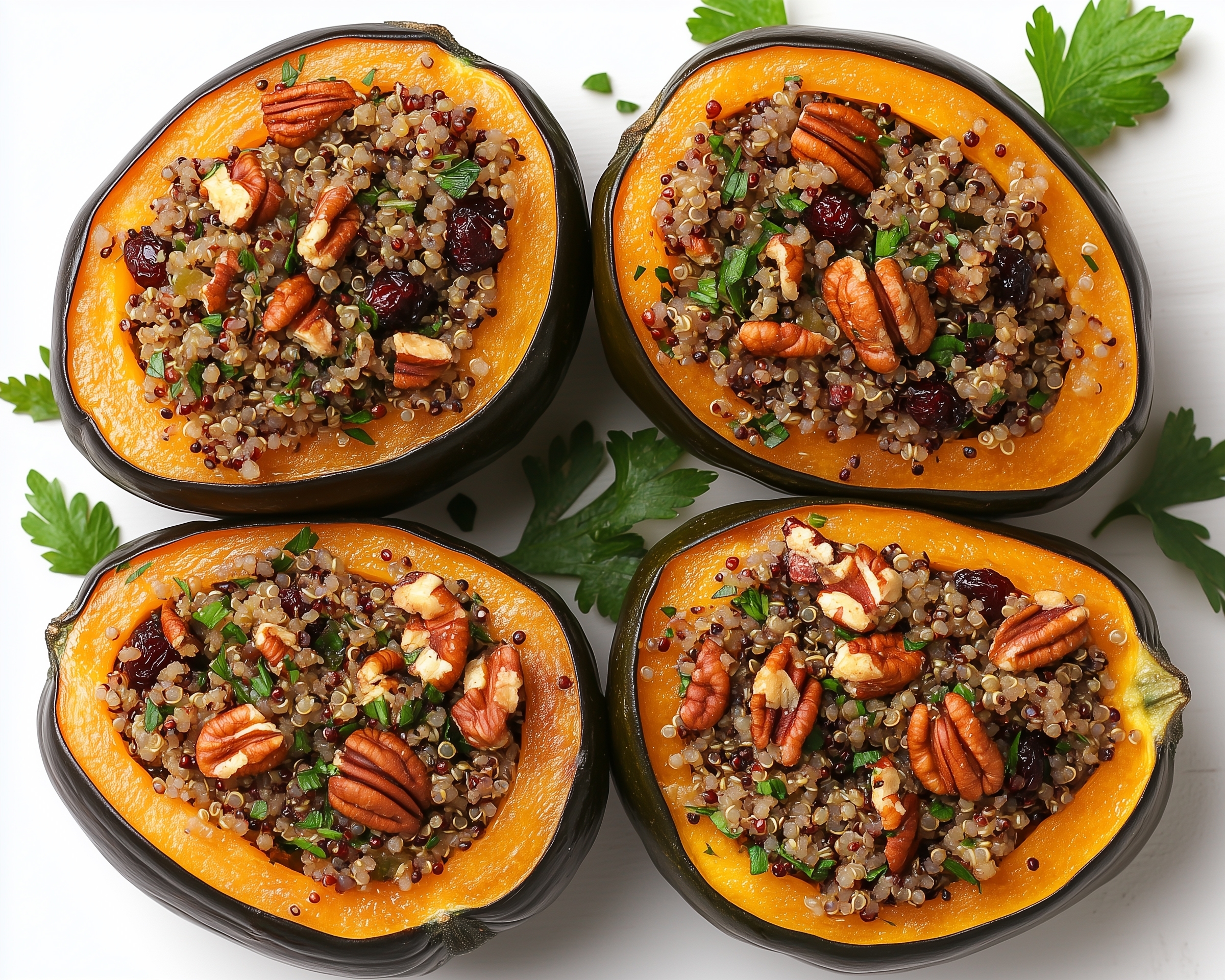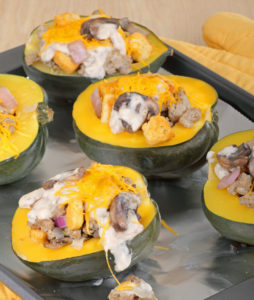

In honor of National Acorn Squash Day ( who knew!) here is one of our favorites!
Eastern View: Acorn Squash is a nourishing, grounding vegetable whose sweetness can be the centerpiece of any hearty meal. As the sweet taste is almost always cold, be sure to warm your acorn squash with mild spices like cinnamon and nutmeg, or more savory options like black pepper.
Many squashes are somewhat difficult to digest, while acorn squash is only a mild digestive challenge. These spices will enhance the digestibility of acorn squash.
The orange color of acorn squash is a sign of high beta-carotene, which is a liver tonic and good for eyes.
Western View: Acorn squash is a small variety of winter squash named for its resemblance to a large acorn. Like its close cousin’s butternut squash and spaghetti squash, acorn squash is more nutrient-dense than all types of summer squash. Acorn squash is rich in vitamins, minerals, dietary fiber, and antioxidant compounds. A diet with a high intake of the nutrients provided by acorn squash may decrease the risk of a number of serious medical conditions.
Acorn squash contains vitamin A, niacin, folate, thiamine and vitamin B-6, but it is an especially good source of vitamin C. A 1/2-cup serving of cooked, cubed acorn squash provides approximately 20 percent of the recommended daily allowance of vitamin C for healthy adults following a 2,000-calorie diet. Adequate vitamin C intake promotes the health of the immune and skeletal systems and may help prevent hypertension, heart disease, cancer, and osteoarthritis.
Each 1/2-cup serving of acorn squash contains 13 percent of the recommended daily allowance of potassium and 11 percent of the RDA of magnesium. As both a mineral and an electrolyte, potassium plays a vital role in muscle contraction and in maintaining the body’s water balance. Magnesium regulates potassium levels, strengthens bones and teeth and aids in proper energy metabolism. Regularly eating potassium- and magnesium-rich foods like acorn squash can lessen your chance of stroke, osteoporosis, depression, and diabetes. Acorn squash also contains small amounts of iron, calcium, zinc, and phosphorus.
The American Dietetic Association lists winter squash as one of the best sources of the antioxidant beta carotene. Antioxidants are compounds that can prevent cellular and DNA damage by inhibiting the activity of unstable free radicals. A high intake of antioxidant-rich foods is linked to a lower risk of cancer, neurological disorders, cardiovascular disease, and diabetes. Beta-carotene is a carotenoid that may specifically support eye health and prevent the development of age-related macular degeneration.
Acorn squash provides 5 grams of dietary fiber in every 1/2-cup serving, an amount that fulfills 18 percent of the recommended daily intake of fiber. The majority of acorn squash’s fiber is soluble fiber. According to Mayoclinic.com, this type of fiber helps regulate blood levels of both glucose and cholesterol.
Slice peppers. Mince garlic. Clean and quarter mushrooms.
Serving Size: 4
Prep Time: 20 minutes
Cook Time: 50 minutes
Preheat the oven to 375 degrees F. Trim the tops and bottoms off the squash. Cut in half horizontally so the cut-ends will keep the pieces flat. Clean the inside of the squash. Separate the seeds from the membranes and rinse well. Dry the seeds with a paper towel and set aside.
Place the squash cut-side up on a baking sheet, drizzle with the olive oil and sprinkle with 1 teaspoon of the salt and pepper. Place the seeds on a separate baking sheet or foil. Roast the squash 30 minutes. Roast the seeds at the same time, checking and moving them around after 10 minutes and again after 20 minutes. Sprinkle the seeds with the remaining salt, and set aside with the squash.
Set a large saute pan over high heat and add the ghee. When melted, add onions, peppers, sprinkle with salt and pepper and gently toss to combine. Add the mushrooms and cook, 3 to 4 minutes. Add the garlic and toss to combine. Saute 2 to 4 minutes longer, and adjust the seasoning with salt and pepper.
Preheat the broiler to low. Fill the roasted acorn squash halves with the filling. Sprinkle the crumbled goat cheese over the top, then top with the roasted squash seeds. Broil just until the cheese is warm. Garnish with a small amount of Italian parsley, if using, and serve.
Pitta | Substitute cilantro for parsley.
Kapha | Use cauliflower instead of acorn squash.
Vata | Enjoy as is.
Vata/Kapha | No substitutions needed.
Pitta/Kapha | Switch out the parsley for cilantro.
There’s no one size fits all for what you should eat. If you would like to talk with me about what is the right diet for you, sign up for a complimentary consultation. Just click on the link to my online calendar to find a good time that works for you.
In health,
CHAT WITH US NOW-FOR THE FOODS THAT ARE RIGHT FOR YOU

The Holistic HIghway integrates traditional Western medical practices with Ayurveda medicine, creating a focus on prevention through nutrition, diet, and exercise; use of the latest genetic testing and other diagnostic techniques; and prescribed combinations of botanical medicines, supplements, therapeutic diets, detoxification programs, or stress-management techniques.

Integrative Health Expert | Ayurveda Practitioner | Author | Speaker
Kerry is a globally recognized leader in integrative medicine and the science of health known as Ayurveda. She is passionate about raising awareness of the need for a change in contemporary medicine that focuses on patient empowerment and a health-based (rather than disease-based) medical system.
Kerry is connected with The University of Pittsburgh Center for Integrative Medicine and remains a pioneer in the field of integrative medicine where she has developed a personalized system to manage chronic disorders by incorporating fundamental changes in diet, behavior, and stress while focusing on genetics.
This individualized program is so successful that many of her clients have achieved maximum healing and vitality after years of chronic problems!
More to Explore